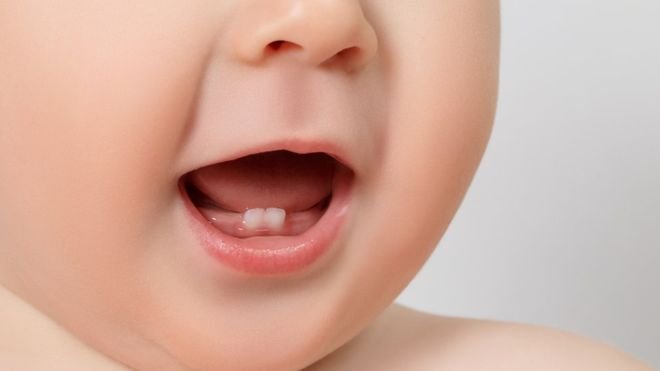Teething, When Do Babies Start Teething? Symptoms, and Signs for babies!
Teething :
Teething in children is a process that parents are expecting because of their happiness in them and because it indicates the natural growth of the child and the completion of the calcium rate.It is, of course, one of the most difficult periods for the parents, and symptoms of teething in children range from minor disturbances, such as some crying or pain, or severe symptoms such as vomiting, diarrhea, convulsions, and sleep disturbances. You know with us in this article about all the symptoms of teething in infants and ways to relieve the pain of the child in this period, as well as the pediatric teething table.Types of teeth :
The beginning of tooth growth or what is known as teething in children, start teeth appear in stages do not show all of your babies once and before the parents know the time of the appearance of teeth it is important for them to know the types of teeth:– Dental teeth.
– Permanent teeth.
When do babies start teething?
Most children start teething between the 4th and 7th months of their life, and the first age of some children grows in their third month, these are early teething cases, others are in the first year or more, and these are late teething cases.What are the signs of teething in babies?
-Redness and swelling of the gums :
Teething pain occurs because of the pressure on the gums caused by the tooth beneath it before its emergence, where the gums that are above the age that are preparing to appear and become painful when touched, and the baby’s cheeks may be red and heated.-Irregular sleep :
The teething process may accompany the feeling of pain, which makes the child unable to sleep at night, so try to help him sleep and feel relieved by providing a tranquil, hassle-free atmosphere.-Saliva :
The child’s chin is significantly shaped by a child’s teething, so to avoid chin ulcers, neck area infections, and around the mouth, and avoid skin rash, it is advisable to wipe the area with a soft napkin, or a swab of Vaseline, to form a barrier to prevent inflammation.-Irregular Breastfeeding:
The child may refuse to eat milk from his mother’s breast, or from a bottle of milk because he feels pain while taking it, there may be teeth at the stage of emergency.-Slight redness of the baby’s cheek or pigmentation in pink.
-The severity of the foul and continuous crying:
Teething makes your baby cry more than usual, as a result of the pain he feels, all it takes is to embrace and provide compassion for him.-High temperature significantly, sometimes fever.-Diarrhea.-The inability of the child to sleep.-Ear pain.
-Diarrhea.-The emergence of tooth buds:Which can be observed by passing your fingers on them, you will notice solid teeth in the stage of appearance.

Add Comment